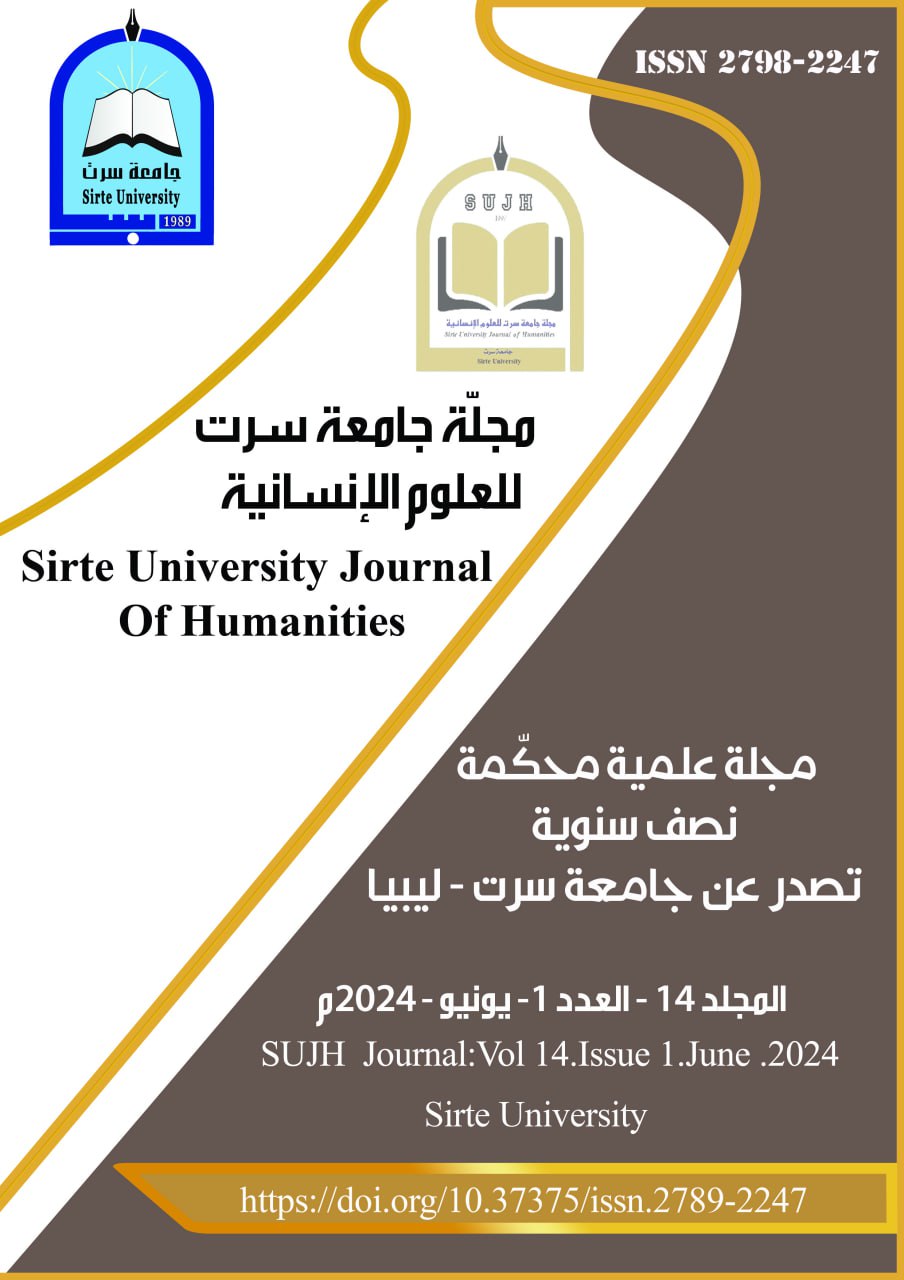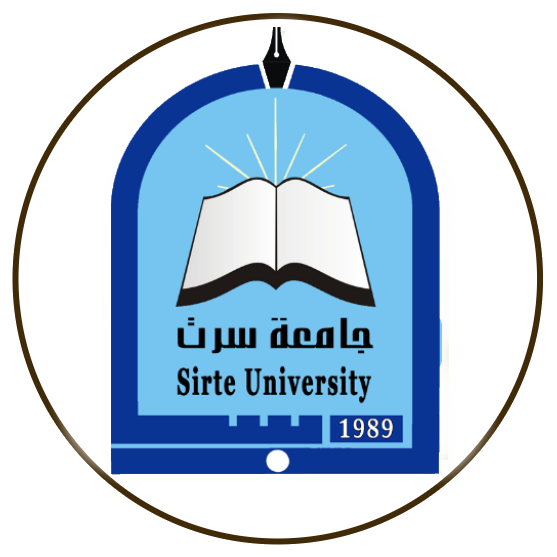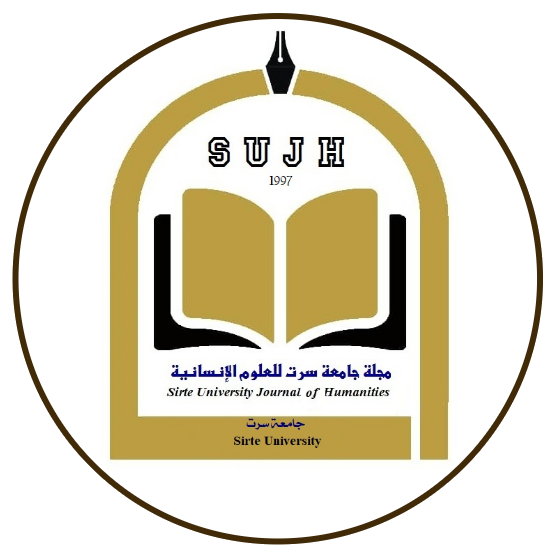استكشاف آراء الطلبة الليبيين الدارسين للغة الإنجليزية كلغة أجنبية حول فعالية استخدام فصول قوقل للتعلم عبر الإنترنت
DOI:
https://doi.org/10.37375/sujh.v14i1.2786الكلمات المفتاحية:
فصول قوقل، آراء وتصورات، طلبة اللغة الإنجليزية كلغة أجنبية، عملية التعلمالملخص
لقد أصبحت فصول قوقل منصة تعليمية معروفة ، و تهدف هذه الدراسة إلى الحصول على نظرة ثاقبة لتصورات طلاب المرحلة الجامعية في قسم اللغة الإنجليزية كلغة أجنبية فيما يتعلق بالتعلم عبر الإنترنت، يعتمد هذا البحث في جمع المعلومات على استخدام استبيان و مقابلة مع بعض الطلبة، و قد شارك في هذه الدراسة 54 طالبًا من طلاب قسم اللغة الإنجليزية في كلية الآداب والتربية بجامعة صبراتة حيث شارك 48 طالبًا في ملء الاستبيانات وتم عمل مقابلات مع 6 طلبة منهم، تبين أن لدى غالبية الطلاب موقف إيجابي تجاه فصول قوقل كتطبيق تعليمي إذ يرون أنه سهل وعملي و له عدة فوائد و لكن له بعض العيوب كذلك.
المراجع
References
Abbasi, S., Ayoob, T., Malik, A., & Memon, S. I. (2020). Perceptions of students regarding E-learning during Covid-19 at a private medical college. Pakistan journal of medical sciences, 36(COVID19-S4), S57.
Abdalla, A., Aljheme, E. & Abdulhadi, F. (2021). Effectiveness of Using Google Classroom as a Blended Learning with the Libyan EFL Learners at Sebha University. International Journal of English Language & Translation Studies. 9(2). 31-37
Ahmed, S. N. (2021). An Examination of Students' Attitude towards the Use of Google Classroom in Preparatory Year English Program. Bulletin of Education and Research, 43(2), 39-59.
Alharbi, O., Alshammari, Y. ., Aldosari, M. O. ., & Albazie, H. A. . (2019). The issues and advantages of the use of new technology in Saudi education: A literature review. Advances in Social Sciences Research Journal, 6(8), 290–295. https://doi.org/10.14738/assrj.68.6941
Al-Fraihat, D., Joy, M., & Sinclair, J. (2020). Evaluating E-learning systems success: An empirical study. Computers in human behavior, 102, 67-86. https://doi.org/10.1016/j.chb.2019.08.004
Alssager, M. . & Nasir , I. . (2021). Evaluation of using Google Classroom as a Tool for Asynchronous E-learning at Sebha University. Journal of Pure & Applied Sciences, 20(1), 44–49. https://doi.org/10.51984/jopas.v20i1.986
Asih, A., Anggraeni, D., Rosdiana, M., wintiawati Dewi, S., Al Muzaqiah, U., & Handayani, U. (2021). Exploring the Students Perception of Online Learning through Google Classroom. JELLi, 1(1), 11-21.
Bryman, A., Bell, E., Mills, A. J., & Yue, A. R. (2007). Business research strategies. Business research methods, 226-238.
Burton, N., Brundrett, M., & Jones, M. (2014). Doing your education research project. Sage.
Cakrawati, L. M. (2017). Students' perceptions on the use of online learning platforms in efl classroom. ELT tech: journal of English Language Teaching and Technology, 1(1), 22-30. URL: http://ejournal.upi.edu/index.php/ELTTech/article/view/9428
Cohen, L., Manion, L., & Morrison, K. (2011). Planning educational research. Research methods in education. London and New York: Routledge.
Creswell, J. W. (2009). Research Design: Qualitative, Quantitative, and Mixed Method Approaches. (3rd ed.). London: SAGE Publication Ltd.
Dabarera, C., Renandya, W. A., & Zhang, L. J. (2014). The impact of metacognitive scaffolding and monitoring on reading comprehension. System, 42, 462-473.
Fedynich, L., Bradley, K. S., & Bradley, J. (2015). Graduate Students' Perceptions of Online Learning. Research in Higher Education Journal, 27.
Goyal, S. (2012). E-Learning: Future of education. Journal of Education and Learning (EduLearn), 6(4), 239-242.
Jawoosh, H., Alshukri, H., Jawoosh, F., Azzawi, Z., & Kzar, M. (2023). The Limitation of The Effectiveness of Google Classroom as An Online Platform in During the Coved-19 Pandemic in Iraqi Universities. International Journal of Membrane Science and Technology. 10. 1767-1776. 10.15379/ijmst.v10i4.2322.
Kacetl, J., & Semradova, I. (2020). Reflection on blended learning and e-learning–case study. Procedia Computer Science, 176, 1322-1327. https://doi.org/10.1016/j.procs.2020.09.141
Kashyap, D. (2018). Perception: meaning, definition, nature and importance.
Lin, C. H., Zhang, Y., & Zheng, B. (2017). The roles of learning strategies and motivation in online language learning: A structural equation modelling analysis. Computers & Education, 113, 75-85.
Oktaria, A. A., & Rohmayadevi, L. (2021). Students' perceptions of using Google Classroom during the COVID-19 Pandemic. International Journal of Educational Management & Innovation, 2(2), 153-163.
Ong, P., Duraippah, K., & Singh, G. S. B. (2020). Students’ perceptions towards using Google Classroom in the learning process at public secondary schools in Kuala Lumpur.
Qudratullah, Q., Aswinda, N., & Najamuddin, N. (2020). Communication patterns of coaches and students in cultivating discipline of memorizing the Qur’an. INJECT (Interdisciplinary Journal of Communication), 5(1), 25-40. https://doi.org/10.18326/inject.v5i1.25-40
Rahmah, D. N., Graselly, G., Arifin, K. A., Safitri, N., & Destari, D. (2021). Students’ perceptions of using Google Classroom in the process of learning English. ETDC: Indonesian Journal of Research and Educational Review, 1(1), 37-45.
Rahmawati, B. F. (2020, May). Learning by Google classroom in students’ perception. In Journal of Physics: Conference Series 1539(1), 012048. 1-6. IOP Publishing.
Ridho, D. M., Sawitri, I. D., & Amatulloh, N. A. (2019, September). Students’ perception toward Google classroom application in EFL classroom. In Prosiding Seminar Nasional Pendidikan (1), 1325-1332.
Saputri, V. N. D. (2020). Students’ perceptions toward the use of Google classroom in teaching and learning process. Semarang: Universitas Negeri Semarang. 1-55.
Schat, S. (2014). Exploring the Relationship between Perception and Education: Rediscovering Perceptual Theory and Its Impact on Teaching and Learning. Canadian Society for the Study of Education, 1-25.
Shana, Z., Alyatim, T. M., Alkhazaleh, M., & Alshalabi, N. (2021). The Use of Google Classroom to Support the Learning Process: Assessing Graduate Student Skills and Perceptions. International Journal of Web-Based Learning and Teaching Technologies (IJWLTT), 16(5), 171-192.
Sibuea, T., & LIA, S. (2018). Students’ perceptions on the use of Google classroom to support blended learning for the pengantar linguistik umum course. Lingua, 3, 45-51.
Suwaed, H. (2021). Choice Made from No Choice: Libyan EFL Students’ Perceptions about Using Google Classroom for Learning Writing during COVID-19 Pandemic. International Journal of English Language & Translation Studies. 9(4). 56-62.
Hanif, M., Asrowi, A., & Sunardi, S. (2018). Students’ access to and perception of using mobile technologies in the classroom: the potential and challenges of implementing mobile learning. Journal of Education and Learning (EduLearn), 12(4), 644-650. http://journal.uad.ac.id/index.php/EduLearn
Surani, D., & Hamidah, H. (2020). Students' perceptions in online class learning during the Covid-19 pandemic. International Journal on Advanced Science, Education, and Religion, 3(3), 83-95. . https://doi.org/10.33648/ijoaser.v3i3.78
Warman, L. A. D. (2022, February). Students’ Perception of the Use of Google Classroom in Flipped English Learning during the COVID-19 Pandemic. In 67th TEFLIN International Virtual Conference & the 9th ICOELT 2021 (TEFLIN ICOELT 2021) (pp. 158-169). Atlantis Press.
Zohrabi, M. (2012). Preliminary Aspects of Language Course Evaluation. Journal of Pan-Pacific Association of Applied Linguistics, 16(1), 123-144.











